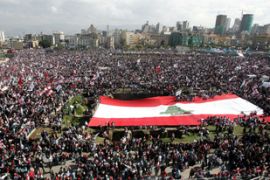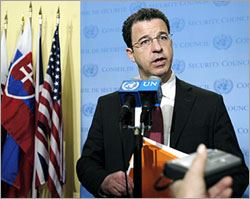Al-Hariri inquiry making progress
But the head of the UN commission wants more time to complete the investigation.

“Over the coming weeks, it will collect samples in three other countries in the region and further countries are identified for another series of sampling missions,” Brammertz said in his seventh progress report.
Since its last report in December, the commission has interviewed 42 people and has identified another 250 potential interviewees.
Political motive
The report also says it has narrowed the motive for al-Hariri’s assassination to his political activities, and that the decision to kill him was taken before he embarked on a “rapprochement” with Syrian and Lebanese political figures.
One hypothesis the inquiry is considering is that those who ordered the attack “saw it as beneficial to kill him before he began his election campaign”.
Al-Hariri was killed in Beirut on February 14, 2005, the day that Lebanon’s parliament was due to debate a new electoral law to be used in forthcoming elections.
A wealthy businessman, al-Hariri, was widely perceived as the leading candidate, Brammertz said.
Syrian connections
 |
| Serge Brammertz says the inquiry needs more time. [AFP] |
The prosecutor said Syria’s was co-operation with the commission “remains generally satisfactory”, although Damascus maintains they had no involvement in al-Hariri’s murder.
Brammertz’s predecessor implicated Syria in the assassination, and street protests after the incident prompted Damascus to withdraw forces that had been in Lebanon for 22 years.
Four pro-Syrian generals, accused of involvement in the attack, have been under arrest for 15 months.
The government and the UN Security Council have approved plans to establish a special court to try al-Hariri’s killers, despite objections from the Hezbollah-led opposition and Emile Lahoud, Lebanon’s pro-Syrian president.
Brammertz said the inquiry is taking place in a “volatile political and security environment”, which is hampering his ability to retain staff and complete the investigation “in a timely fashion”.
The Lebanese government has asked for the commission’s mandate to be extended for another year beyond the current deadline of June 15, 2007.
The commission has also been asked to investigate 16 other politically motivated cases, including the assassination of Lebanese industry minister Pierre Gemayel on November 21, 2006.